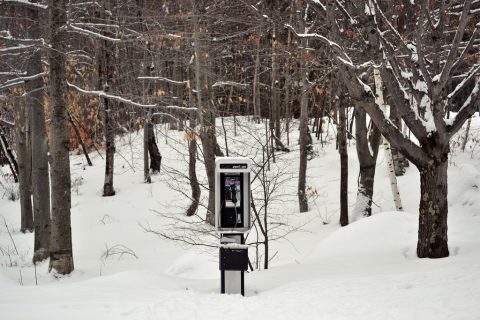My son’s a Boy Scout and just completed a badge where he had to detail what to do if you get lost in the woods—you are indeed supposed to stand still, let others find you instead of circling around each other. I can’t help but think this is a metaphor for Tim’s life, that he’s supposed to stand still, yet he keeps moving. Why can’t this sad preacher stand still?
I think he’s afraid of what might catch up to him if he does. He’s a man of faith without much faith, something of a fraud—at least to himself. The reunion has reminded him once more of his failures as a leader and a “shepherd.” He’s deep in the woods in more ways than one.
Owls usually stand for this deep wisdom (or impatience, if in a lollipop commercial), and in your story, that wisdom seems to be a direct product of vigilance (and patience). What about owls made you want to depict this particular owl and its vantage point?
Rather than a source of wisdom, I saw the owl more as an unsentimental observer. It’s a part of the natural world free of the kinds of worries consuming Tim. It’s a predator, and not likely to feel, or even understand, remorse. The woods—threatening and confining to Tim—are home. The snow piles on its back and it hardly notices. It belongs. At the same time, it has a wide view, and penetrating, objective vision. Tim’s a creature clearly foundering, struggling and slowly succumbing. It studies him out of curiosity, bewildered enough to remain with him at the expense of the potential meal of a passing rabbit.
Lots of information keeps coming out about the violence of football, and nobody’s blaming the players (not like Tim blames himself, anyway) who produce these massive hits, but rather, the nature of the game itself. Will we still have football in twenty years?
It’s hard to imagine football going away. There will probably be superficial changes—better helmets, massaging the rules to reduce some of the violence of hits—and maybe deeper changes at the high school and college levels. But NFL flag football? I’d watch it, but it seems like a long shot.
I can’t help but recall Joyce when I read your end of the story, particularly the end of “The Dead,” your line about death and life and faith falling indiscriminately, like snowflakes, onto the forest floor. Tim and Gabriel both have epiphanies in their stories that change their lives. Were you channeling Joyce when you wrote this? Holy crap, is Joyce the owl?!
I have to admit, the ending echoes that for me as well, but I only saw it after I’d written it. I’ve always liked the rhythm and quiet of those last lines in “The Dead”—the way it sort of zooms the story out. I think I was going for some of the same peace-within-upheaval kind of feeling. Whether I got there or not, well …. Now the owl as James Joyce? I’d like to take credit for that; it’s a nice idea. And it would explain the eye patch.
I just missed a thirtieth class reunion, but it looked like fun, from the pictures I saw on Facebook. Talk about a memorable reunion experience you’ve had. If you’ve never been to one, make (another) one up.
The reunions of mine I’ve been to have been pretty underwhelming, though I’ve missed the last couple. They might have gotten better over time, with people not trying so hard to impress (myself included). My wife’s twenty-year reunion, though, was a blast. It was great being an outsider, watching these people I’d heard so many good stories about—B.J. Gunier, the wrestler, dropping out of a tree to confront me, a classmate of hers with the same last name as mine wondering if he’d somehow married her, and the chipper reunion organizer being heckled off stage (I felt sorry for her, though I’m told she had it coming). This was outside Chicago, far far from my high school in California. My recommendation is definitely go to other people’s reunions, where you don’t have to worry about your former self bogging you down.


